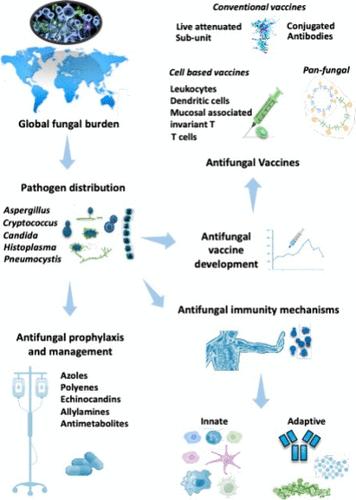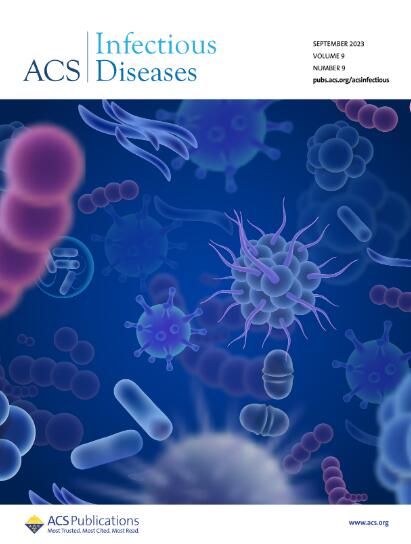The Road Ahead: Advancing Antifungal Vaccines and Addressing Fungal Infections in the Post-COVID World
IF 4
2区 医学
Q2 CHEMISTRY, MEDICINAL
引用次数: 0
Abstract
In impoverished nations, the COVID-19 pandemic has led to a widespread occurrence of deadly fungal diseases like mucormycosis. The limited availability of effective antifungal treatments and the emergence of drug-resistant fungal strains further exacerbate the situation. Factors such as systemic steroid use, intravenous drug misuse, and overutilization of broad-spectrum antimicrobials contribute to the prevalence of hospital-acquired infections caused by drug-resistant fungi. Fungal infections exploit compromised immune status and employ intricate mechanisms to evade immune surveillance. The immune response involves the innate and adaptive immune systems, leading to phagocytic and complement-mediated elimination of fungi. However, resistance to antifungals poses a challenge, highlighting the importance of antifungal prophylaxis and therapeutic vaccination. Understanding the host-fungal immunological interactions and developing vaccines are vital in combating fungal infections. Further research is needed to address the high mortality and morbidity associated with multidrug-resistant fungal pathogens and to develop innovative treatment drugs and vaccines. This review focuses on the global epidemiological burden of fungal infections, host-fungal immunological interactions, recent advancements in vaccine development and the road ahead.

未来之路:推动抗真菌疫苗发展,应对后 COVID 时代的真菌感染问题
在贫困国家,COVID-19 大流行导致粘孢子菌病等致命真菌疾病广泛传播。有效的抗真菌治疗方法有限,耐药真菌菌株的出现进一步加剧了这种状况。全身使用类固醇、静脉注射药物滥用和过度使用广谱抗菌药物等因素导致了由耐药真菌引起的医院获得性感染的流行。真菌感染利用受损的免疫状态和复杂的机制来逃避免疫监视。免疫反应涉及先天性免疫系统和适应性免疫系统,导致吞噬细胞和补体介导的真菌清除。然而,对抗真菌药物的抗药性构成了挑战,突出了抗真菌预防和治疗性疫苗接种的重要性。了解宿主与真菌之间的免疫相互作用和开发疫苗对于抗击真菌感染至关重要。要解决与耐多药真菌病原体相关的高死亡率和发病率问题,并开发创新型治疗药物和疫苗,还需要进一步的研究。本综述重点介绍真菌感染的全球流行病学负担、宿主与真菌之间的免疫相互作用、疫苗研发的最新进展以及未来的发展方向。
本文章由计算机程序翻译,如有差异,请以英文原文为准。
求助全文
约1分钟内获得全文
求助全文
来源期刊

ACS Infectious Diseases
CHEMISTRY, MEDICINALINFECTIOUS DISEASES&nb-INFECTIOUS DISEASES
CiteScore
9.70
自引率
3.80%
发文量
213
期刊介绍:
ACS Infectious Diseases will be the first journal to highlight chemistry and its role in this multidisciplinary and collaborative research area. The journal will cover a diverse array of topics including, but not limited to:
* Discovery and development of new antimicrobial agents — identified through target- or phenotypic-based approaches as well as compounds that induce synergy with antimicrobials.
* Characterization and validation of drug target or pathways — use of single target and genome-wide knockdown and knockouts, biochemical studies, structural biology, new technologies to facilitate characterization and prioritization of potential drug targets.
* Mechanism of drug resistance — fundamental research that advances our understanding of resistance; strategies to prevent resistance.
* Mechanisms of action — use of genetic, metabolomic, and activity- and affinity-based protein profiling to elucidate the mechanism of action of clinical and experimental antimicrobial agents.
* Host-pathogen interactions — tools for studying host-pathogen interactions, cellular biochemistry of hosts and pathogens, and molecular interactions of pathogens with host microbiota.
* Small molecule vaccine adjuvants for infectious disease.
* Viral and bacterial biochemistry and molecular biology.
 求助内容:
求助内容: 应助结果提醒方式:
应助结果提醒方式:


